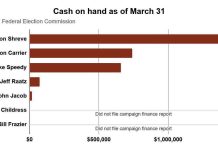The Columbus Police Department and the city of Columbus have reached a settlement with former Mayor Kristen Brown, agreeing to pay her $32,000 for attorney fees, court costs and other expenses Brown incurred in a public access lawsuit against the department.
The settlement agreement was announced Monday, along with the city’s and Brown’s request that the court dismiss an appeal as the parties have resolved the matter. Brown had said her attorney fees were approaching $50,000 in the case.
The city has paid Faegre Baker Daniels $79,813.50 in fees for legal representation in Brown’s lawsuit, according to city records.
The settlement agreement was signed Aug. 9 by Alan Whitted, Columbus city attorney and Aug. 12 by Brown, according to court documents.
[sc:text-divider text-divider-title=”Story continues below gallery” ]
Payment will come from the city’s Board of Works “miscellaneous services” budget line, said Jamie Brinegar, city director of finance. Among other items that are paid out of this line item are railroad camera fees, primary election costs and insurance deductibles.
“At the end of the day, my attorneys ended up discounting my fees in the interest of getting this over with,” Brown said in a telephone interview on Monday. She said the $32,000 will cover her attorney fees for the case.
“It is my belief and understanding that this lawsuit was the most costly public access lawsuit in anyone’s memory,” Brown said of the case. “I find the whole thing shocking and appalling.”
Brown continues to contend that the police report existed and that Columbus Police Chief Jon Rohde lied about its existence. Rohde has said in an earlier interview he did not lie.
“It takes a citizen with the wherewithal and knowledge of the public access laws — it took more than two-and-a-half years — I was at over $45,000 in legal fees and (Mayor Jim) Lienhoop was fighting my fees,” she said. “No one has the financial wherewithal to do this.”
Brown said those who challenge the public access denials will be vilified and demonized by the city. “The city hired three attorneys at $595 an hour to fight this,” she said. “Who could put the time and money and risk into this? They clearly violated the law.”
Brown said she plans to use the lawsuit as an example to encourage state legislators to strengthen public access laws so that government officials are held accountable, saying the current public access laws have “no teeth.”
She also said she thought Special Judge Richard W. Poynter was biased toward CPD when he said the city did not intentionally violate the law.
Poynter ruled in June that the Columbus Police Department’s response to Brown’s public information request about an incident involving a Bartholomew County Jail corrections officer violated the Indiana Access to Public Records Act.
“The court finds that the information CPD initially provided to Brown pursuant to her public records request in the Public Incident Report contained insufficient ‘information’ to meet the requirements of (the Indiana Access to Public Records Act),” Poynter wrote in the decision. “… Merely listing ‘Criminal Mischief/Vandalism’ and ‘Domestic Disturbance’ does not provide any factual evidence. There was no general description of any injuries, property or weapons involved. The only reference to any injuries, property or weapons involved was ‘other weapon,’ which is an insufficient description; nor was there any description of the property damage involved in the incident.”
Poynter ruled June 17 that the police department should pay Brown’s “reasonable attorney fees, court costs and expenses in litigating this matter.” The parties were ordered to agree upon an amount within 60 days.
The dispute between Brown and CPD, which led to the lawsuit, started in September 2016, when Brown submitted a public records request about a domestic dispute that occurred on Aug. 23, 2016, according to the lawsuit.
The Aug. 23, 2016, incident involved former jail commander Gary Myers and his then-wife Sabrina S. Myers, according to the public incident report. The report also lists that two vehicles were involved in the incident, one of which was owned by the sheriff’s department. No charges were filed related to the incident, according to court records.
On Sept. 26, 2016, Rohde responded to Brown’s request, providing an incident report that classified the incident as criminal mischief/vandalism and domestic disturbance and listed the weapon or tools involved in the incident as “other weapon.” No other factual circumstances or description of any injuries, property or weapons involved in the incident were disclosed at that time, the lawsuit states.
Four days later, Brown filed a formal complaint with Indiana’s public access counselor, alleging that the incident report provided to her did not meet the standards of two provisions of the Indiana Access to Public Records Act because it didn’t include “the factual circumstances surrounding the incident” and “a general description of any injuries, property or weapons involved.”
Whitted said the settlement announced Monday concludes all litigation involving Brown that had been pending about the Myers case.




